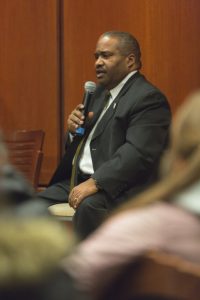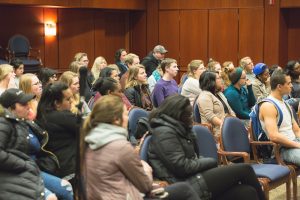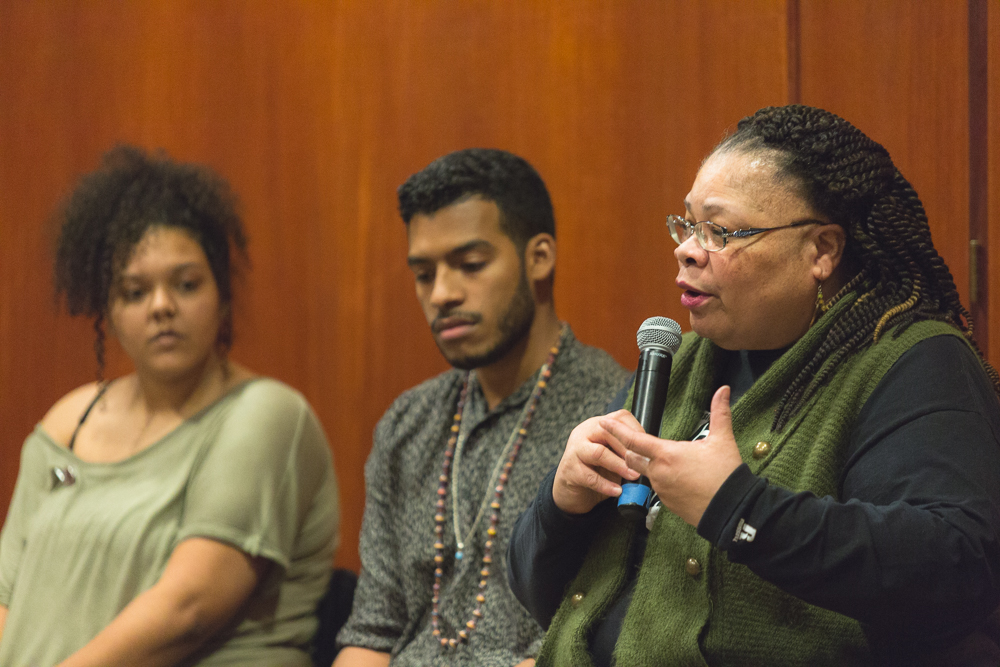As part of Black History Month, Bethel’s Black Student Union held a panel discussion in the Eastlund room Feb. 21. The panelists included Vice President of Student Life William Washington, professor Karen McKinney, professor Andre Koen, United Cultures of Bethel Executive Director Taz Song’ony and recent Bethel graduate Andrew Rahme.
“We wanted to create a platform for black people that are attached to Bethel’s community to speak their truth and about the different things that have impacted their lives,” said freshman Meti Regassa, one of the organizers for the event.
“They all identify as black, but they all have their own stories and backgrounds, so you get to see the different perspectives of different people,” Regassa said.
With this in mind, the theme of the event was “black culture is multicultural,” and through a variety of questions moderated by Campus Ministries Dean Laurel Bunker, the panelists unpacked for listeners a bit of their cultural stories.
Questions ranged from the specific, “Does your family feel American?” to the broad, “How does media represent blacks?” – eliciting answers both personal and general. The panelists illustrated what it meant for each of them to be black in various times and places.
While each had their own opinions and experiences, there was a unanimous “no” when panelists were asked if we were in a post-racialized society.
“Post-racial would mean we’re all done with that,” McKinney said, “and that’s not true.”
As examples of current systems of oppression, Song’Ony cited the school-to-prison pipeline which is overrepresented by black men and gentrification of historically black neighborhoods.
Each panelist shared painful stories of how they had been judged unfairly.
“He said I didn’t represent America,” recounted McKinney as she explained why her high school German teacher had refused to give her an application to be a foreign exchange student.
Washington shared about the difficulties of being shown an apartment.

“The lady wouldn’t even let me in the door,” Washington said, while his white friends were shown the available apartments with ease.
Despite the hardships, the panelists said they are proud to be black.
“Say it loud! I’m black and I’m proud,” McKinney and Washington quoted from the 1968 James Brown song.
Song’ony said she prefers being called black over African American.
“It gives me a sense of empowerment,” Song’ony said.
In regards to their culture, the panelists love the community, the worship, the literature, the language and much more.
Rahme explained how a thing may be considered inappropriate when a black person does it and then trendy when done by a white person. For example, he noted that words and phrases developed in black communities are often adopted by the greater culture.
Koen agreed. “It’s clear to me that America loves black culture without black people.”
There is excitement and hope for the future, though. With the recent premiere of the movie Black Panther, Song’Ony hopes to see more black producers and more dimensional characters in the theatre.
“We’ve come a long ways, but there’s a ways to go,” Washington said.

The panel discussion ended with a Q and A for audience members.
“A lot of times when you talk about race, people get on the defensive side,” Regassa said, “But it’s really not about placing blame, it’s about opening each other’s eyes to the privileges we may or may not be granted through our race and what we can do to help one another.”


















